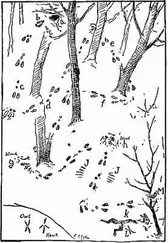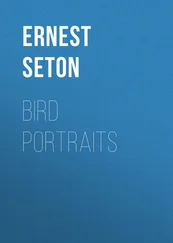Ernest Seton - Rolf in the Woods
Здесь есть возможность читать онлайн «Ernest Seton - Rolf in the Woods» весь текст электронной книги совершенно бесплатно (целиком полную версию без сокращений). В некоторых случаях можно слушать аудио, скачать через торрент в формате fb2 и присутствует краткое содержание. Год выпуска: 1997, Жанр: Приключения про индейцев, Исторические приключения, на английском языке. Описание произведения, (предисловие) а так же отзывы посетителей доступны на портале библиотеки ЛибКат.
- Название:Rolf in the Woods
- Автор:
- Жанр:
- Год:1997
- ISBN:нет данных
- Рейтинг книги:3 / 5. Голосов: 1
-
Избранное:Добавить в избранное
- Отзывы:
-
Ваша оценка:
- 60
- 1
- 2
- 3
- 4
- 5
Rolf in the Woods: краткое содержание, описание и аннотация
Предлагаем к чтению аннотацию, описание, краткое содержание или предисловие (зависит от того, что написал сам автор книги «Rolf in the Woods»). Если вы не нашли необходимую информацию о книге — напишите в комментариях, мы постараемся отыскать её.
Rolf in the Woods — читать онлайн бесплатно полную книгу (весь текст) целиком
Ниже представлен текст книги, разбитый по страницам. Система сохранения места последней прочитанной страницы, позволяет с удобством читать онлайн бесплатно книгу «Rolf in the Woods», без необходимости каждый раз заново искать на чём Вы остановились. Поставьте закладку, и сможете в любой момент перейти на страницу, на которой закончили чтение.
Интервал:
Закладка:
Quickly the deadfalls were baited and set; last the Indian threw into the trap chamber a piece of moss on which was a drop of the "smell," and wiped another drop on each of his moccasins. "Phew," said Rolf.
"That make a trail the marten follow for a month," was the explanation. Skookum seemed to think so too, and if he did not say "phew," it was because he did not know how.
Very soon the little dog treed a flock of partridge and Rolf with blunt arrows secured three. The breasts were saved for the hunters' table, but the rest with the offal and feathers made the best of marten baits and served for all the traps, till at noon they reached the beaver pond. It was covered with ice too thin to bear, but the freshly used landing places were easily selected. At each they set a strong, steel beaver-trap, concealing it amid some dry grass, and placing in a split stick a foot away a piece of moss in which were a few drops of the magic lure. The ring on the trap chain was slipped over a long, thin, smooth pole which was driven deep in the mud, the top pointing away from the deep water. The plan was old and proven. The beaver, eager to investigate that semifriendly smell, sets foot in the trap; instinctively when in danger he dives for the deep water; the ring slips along the pole till at the bottom and there it jams so that the beaver cannot rise again and is drowned.
In an hour the six traps were set for the beavers; presently the hunters, skirmishing for more partridges, had much trouble to save Skookum from another porcupine disaster.
They got some more grouse, baited the traps for a couple of miles, then camped for the night.
Before morning it came on to snow and it was three inches deep when they arose. There is no place on earth where the first snow is more beautiful than in the Adirondacks. In early autumn nature seems to prepare for it. Green leaves are cleared away to expose the berry bunches in red; rushbeds mass their groups, turn golden brown and bow their heads to meet the silver load; the low hills and the lines of various Christmas trees are arrayed for the finest effect: the setting is perfect and the scene, but it lacks the lime light yet. It needs must have the lavish blaze of white. And when it comes like the veil on a bride, the silver mountings on a charger's trappings, or the golden fire in a sunset, the shining crystal robe is the finishing, the crowning glory, without which all the rest must fail, could have no bright completeness. Its beauty stirred the hunters though it found no better expression than Rolf's simple words, "Ain't it fine," while the Indian gazed in silence.
There is no other place in the eastern woods where the snow has such manifold tales to tell, and the hunters that day tramping found themselves dowered over night with the wonderful power of the hound to whom each trail is a plain record of every living creature that has passed within many hours. And though the first day after a storm has less to tell than the second, just as the second has less than the third, there was no lack of story in the snow. Here sped some antlered buck, trotting along while yet the white was flying. There went a fox, sneaking across the line of march, and eying distrustfully that deadfall. This broad trail with many large tracks not far apart was made by one of Skookum's friends, a knight of many spears. That bounding along was a marten. See how he quartered that thicket like a hound, here he struck our odour trail. Mark, how he paused and whiffed it; now away he goes; yes, straight to our trap.
"It's down; hurrah!" Rolf shouted, for there, dead under the log, was an exquisite marten, dark, almost black, with a great, broad, shining breast of gold.
They were going back now toward the beaver lake. The next trap was sprung and empty; the next held the body of a red squirrel, a nuisance always and good only to rebait the trap he springs. But the next held a marten, and the next a white weasel. Others were unsprung, but they had two good pelts when they reached the beaver lake. They were in high spirits with their good luck, but not prepared for the marvellous haul that now was theirs. Each of the six traps held a big beaver, dead, drowned, and safe. Each skin was worth five dollars, and the hunters felt rich. The incident had, moreover, this pleasing significance: It showed that these beavers were unsophisticated, so had not been hunted. Fifty pelts might easily be taken from these ponds.
The trappers reset the traps; then dividing the load, sought a remote place to camp, for it does not do to light a fire near your beaver pond. One hundred and fifty pounds of beaver, in addition, to their packs, was not a load to be taken miles away; within half a mile on a lower level they selected a warm place, made a fire, and skinned their catch. The bodies they opened and hung in a tree with a view to future use, but the pelts and tails they carried on.
They made a long, hard tramp that day, baiting all the traps and reached home late in the night.
Chapter 32.
The Antler-bound Bucks
IN THE man-world, November is the month of gloom, despair, and many suicides. In the wild world, November is the Mad Moon. Many and diverse the madnesses of the time, but none more insane than the rut of the white-tailed deer. Like some disease it appears, first in the swollen necks of the antler-bearers, and then in the feverish habits of all. Long and obstinate combats between the bucks now, characterize the time; neglecting even to eat, they spend their days and nights in rushing about and seeking to kill.
Their horns, growing steadily since spring, are now of full size, sharp, heavy, and cleaned of the velvet; in perfection. For what? Has Nature made them to pierce, wound, and destroy? Strange as it may seem, these weapons of offence are used for little but defence; less as spears than as bucklers they serve the deer in battles with its kind. And the long, hard combats are little more than wrestling and pushing bouts; almost never do they end fatally. When a mortal thrust is given, it is rarely a gaping wound, but a sudden springing and locking of the antlers, whereby the two deer are bound together, inextricably, hopelessly, and so suffer death by starvation. The records of deer killed by their rivals and left on the duel-ground are few; very few and far between. The records of those killed by interlocking are numbered by the scores.
There were hundreds of deer in this country that Rolf and Quonab claimed. Half of them were bucks, and at least half of these engaged in combat some times or many times a day, all through November; that is to say, probably a thousand duels were fought that month within ten miles of the cabin. It was not surprising that Rolf should witness some of them, and hear many more in the distance.
They were living in the cabin now, and during the still, frosty nights, when he took a last look at the stars, before turning in, Rolf formed the habit of listening intently for the voices of the gloom. Sometimes it was the "hoo-hoo" of the horned-owl, once or twice it was the long, smooth howl of the wolf; but many times it was the rattle of antlers that told of two bucks far up in the hardwoods, trying out the all-important question, "Which is the better buck?"
One morning he heard still an occasional rattle at the same place as the night before. He set out alone, after breakfast, and coming cautiously near, peered into a little, open space to see two bucks with heads joined, slowly, feebly pushing this way and that. Their tongues were out; they seemed almost exhausted, and the trampled snow for an acre about plainly showed that they had been fighting for hours; that indeed these were the ones he had heard in the night. Still they were evenly matched, and the green light in their eyes told of the ferocious spirit in each of these gentle-looking deer.
Читать дальшеИнтервал:
Закладка:
Похожие книги на «Rolf in the Woods»
Представляем Вашему вниманию похожие книги на «Rolf in the Woods» списком для выбора. Мы отобрали схожую по названию и смыслу литературу в надежде предоставить читателям больше вариантов отыскать новые, интересные, ещё непрочитанные произведения.
Обсуждение, отзывы о книге «Rolf in the Woods» и просто собственные мнения читателей. Оставьте ваши комментарии, напишите, что Вы думаете о произведении, его смысле или главных героях. Укажите что конкретно понравилось, а что нет, и почему Вы так считаете.




